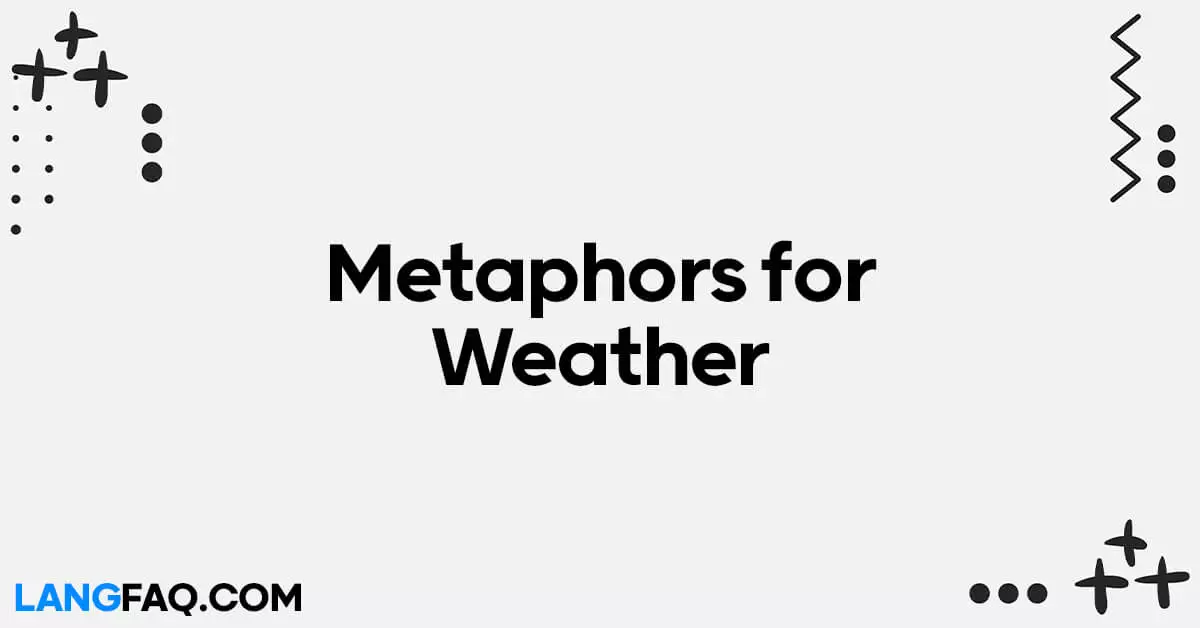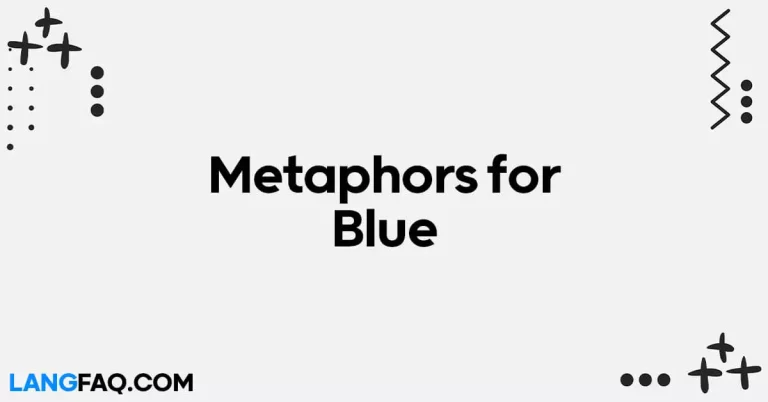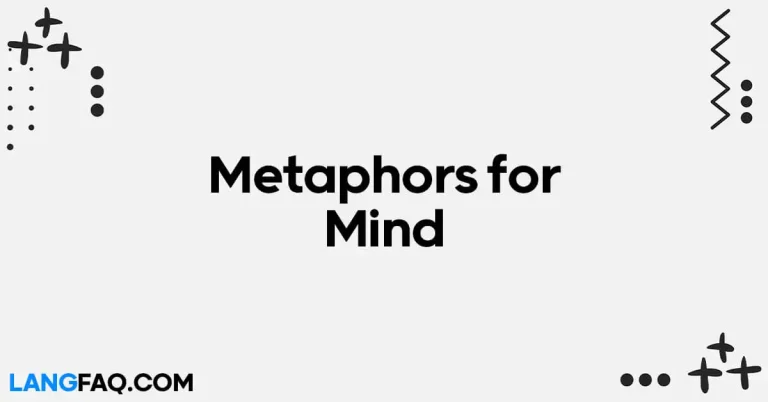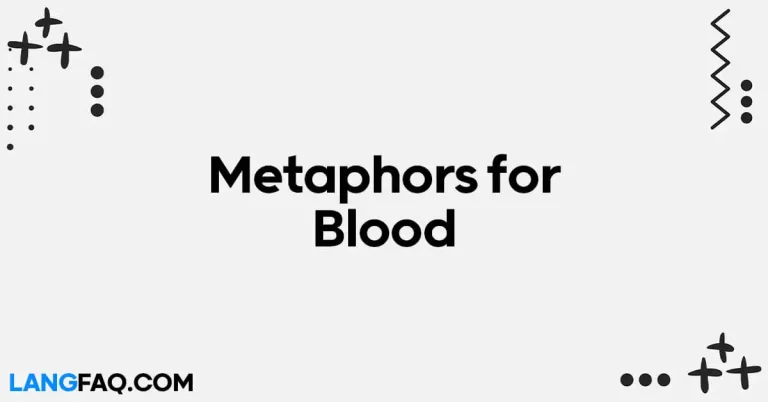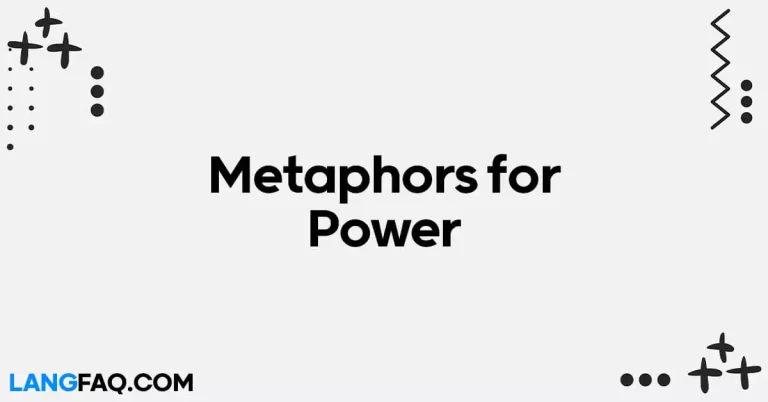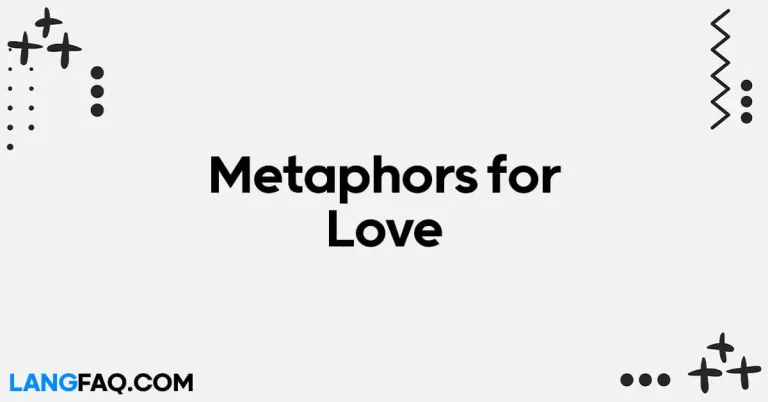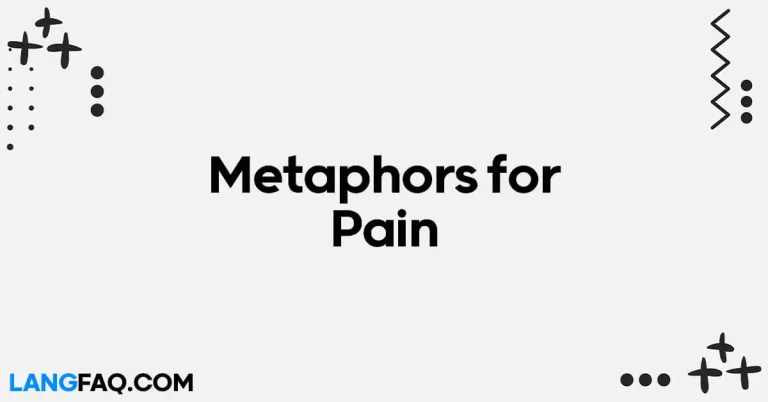Weather has always fascinated us, inspiring poets, writers, and everyday conversations. It’s amazing how the elements can be described in countless ways, each metaphor painting a unique picture of nature’s moods. In this article, we delve into the world of weather metaphors, exploring 26 captivating expressions that bring the elements to life.
26 Metaphors for Weather
- The Sky’s Tears – Describing rain as “the sky’s tears” conveys a sense of sadness or melancholy.
- A Blanket of Snow – Snowfall can be compared to a cozy blanket covering the ground.
- The Roar of Thunder – Thunderstorms are nature’s orchestra, with thunder as its powerful percussion.
- The Whispering Wind – Gentle breezes are like whispers from the wind, carrying secrets and stories from afar.
- The Sun’s Embrace – Sunshine can be described as the warm and comforting embrace of the sun.
- Mist’s Mysteries – Fog and mist can shroud the world in mystery, concealing what lies beyond.
- The Icy Grip of Winter – Winter’s chill can be compared to an icy grip, as it freezes everything in its path.
- Dancing Raindrops – When raindrops fall, they dance on surfaces, creating a rhythmic and soothing melody.
- The Breath of Autumn – The cool, crisp air of autumn is like a refreshing breath of nature.
- The Fiery Sunset – A sunset can be likened to a fire in the sky, painting the horizon with vibrant colors.
- The Hush of Snowfall – As snow falls gently to the ground, it creates a hushed atmosphere.
- The Wrath of the Storm – Storms can be described as nature’s fury, unleashing its anger upon the world.
- The Gentle Caress of Spring – Spring’s arrival is like a gentle caress, awakening the world from its slumber.
- The Ocean’s Sigh – Waves crashing on the shore can be compared to the deep sighs of the ocean.
- The Whispers of the Leaves – Rustling leaves in the wind are like whispers from the trees, sharing their secrets with the world.
- The Velvet Night – A clear, starry night can be described as velvety, soft, and full of dreams.
- The Embrace of the Tides – High tides can be likened to the sea’s loving embrace, reaching out to touch the shore.
- The Song of the Birds – Birdsong in the morning is like nature’s symphony, announcing the arrival of a new day.
- The Scent of Rain – The earthy smell that follows rain can be compared to nature’s perfume.
- The Breath of Summer – Summer’s warmth is like a gentle breath, wrapping us in its comforting embrace.
- The Laughter of Sunshine – Sunshine can be described as nature’s laughter, bringing joy and brightness.
- The Cradle of Clouds – Clouds can be seen as a cradle, rocking the sky to sleep with their gentle movements.
- The Velvet Touch of Dusk – Dusk, with its soft, fading light, is like a velvet touch, signaling the end of the day.
- The Symphony of Rainbows – Rainbows are nature’s symphony of colors, a beautiful and harmonious display.
- The Whispers of the Stars – The night sky, adorned with stars, seems to whisper the secrets of the universe.
- The Fury of a Hurricane – Hurricanes can be likened to nature’s fury, a powerful and destructive force.
| Metaphor | Meaning | Example Sentence |
|---|---|---|
| The Sky’s Tears | Rain symbolizing sadness | “The sky’s tears fell as she grieved.” |
| A Blanket of Snow | Snowfall as a cozy covering | “The town was covered in a blanket of snow.” |
| The Roar of Thunder | Thunderstorms as nature’s orchestra | “The roar of thunder shook the entire house.” |
| The Whispering Wind | Gentle breezes as whispers from the wind | “The whispering wind carried tales of the past.” |
| The Sun’s Embrace | Sunshine as a warm and comforting embrace | “She basked in the sun’s embrace on the beach.” |
| Mist’s Mysteries | Fog and mist shrouding the world in mystery | “The mist’s mysteries concealed the path ahead.” |
| The Icy Grip of Winter | Winter’s chill compared to an icy grip | “The icy grip of winter froze the lake solid.” |
| Dancing Raindrops | Raindrops creating a rhythmic melody | “The dancing raindrops played on the roof.” |
| The Breath of Autumn | Autumn air as a refreshing breath of nature | “She inhaled the breath of autumn in the forest.” |
| The Fiery Sunset | A sunset resembling a fiery spectacle | “The fiery sunset painted the sky with red.” |
| The Hush of Snowfall | Snowfall creating a hushed atmosphere | “The hush of snowfall blanketed the city.” |
| The Wrath of the Storm | Storms as nature’s fury | “The wrath of the storm unleashed chaos.” |
| The Gentle Caress of Spring | Spring’s arrival as a gentle caress | “The gentle caress of spring awakened the flowers.” |
| The Ocean’s Sigh | Waves as deep sighs of the ocean | “The ocean’s sigh was heard from the shore.” |
| The Whispers of the Leaves | Rustling leaves as whispers from the trees | “The whispers of the leaves calmed her soul.” |
| The Velvet Night | A clear, starry night described as velvety | “The velvet night was perfect for stargazing.” |
| The Embrace of the Tides | High tides compared to the sea’s loving embrace | “The embrace of the tides reached the shoreline.” |
| The Song of the Birds | Birdsong in the morning as nature’s symphony | “The song of the birds welcomed the day.” |
| The Scent of Rain | The earthy smell after rain as nature’s perfume | “The scent of rain refreshed the garden.” |
| The Breath of Summer | Summer’s warmth as a gentle breath | “The breath of summer kissed her skin.” |
| The Laughter of Sunshine | Sunshine symbolizing nature’s laughter | “The laughter of sunshine filled the park.” |
| The Cradle of Clouds | Clouds rocking the sky like a cradle | “The cradle of clouds lulled the day to sleep.” |
| The Velvet Touch of Dusk | Dusk described as a velvety, soft touch | “The velvet touch of dusk settled over the city.” |
| The Symphony of Rainbows | Rainbows as a symphony of colors | “The symphony of rainbows graced the sky.” |
| The Whispers of the Stars | The night sky’s secrets resembling whispers | “The whispers of the stars filled the night.” |
| The Fury of a Hurricane | Hurricanes as nature’s powerful fury | “The fury of the hurricane wreaked havoc.” |
These metaphors add vividness and depth to descriptions of weather, allowing readers to visualize and connect with nature in a unique way.
1. The Sky’s Tears
Alternative Words/Phrases:
- Heavenly Weeping
- Celestial Crying
- Atmospheric Sorrow
Explanation: “The Sky’s Tears” is a metaphor that poetically describes rain as if the sky is shedding tears. It conveys a sense of sadness or sorrow associated with rainy weather.
Scenario: Formal Context: In a formal email discussing a weather-related event or news, you can use this metaphor to add a touch of literary flair. For example, “Dear colleagues, due to the recent inclement weather, the sky’s tears have been relentless, causing flooding in several areas.”
Informal Context: When chatting with friends about a rainy day, you might say, “I love how the sky’s tears make everything feel fresh and clean.”
Example Sentence: “The sky’s tears fell gently upon the garden, nurturing the flowers and bringing life to the earth.”
2. A Blanket of Snow
Alternative Words/Phrases:
- White Comfort
- Winter’s Cover
- Frosty Blanket
Explanation: “A Blanket of Snow” compares snowfall to a cozy covering that blankets the ground, creating a serene and peaceful landscape.
Scenario: Formal Context: In a formal report about winter weather conditions, you can use this metaphor to describe the extent of snowfall. For instance, “The region experienced a substantial blanket of snow, resulting in travel disruptions.”
Informal Context: When sharing your excitement about the first snowfall with friends, you might say, “Waking up to a world covered in a blanket of snow is pure magic!”
Example Sentence: “The town was enveloped in a pristine blanket of snow, muffling the sounds of the bustling city.”
3. The Roar of Thunder
Alternative Words/Phrases:
- Thunder’s Symphony
- Sky’s Drumroll
- Nature’s Percussion
Explanation: “The Roar of Thunder” likens thunderstorms to a powerful orchestra, with thunder serving as its percussion instrument. It conveys the intensity and dramatic nature of thunderstorms.
Scenario: Formal Context: In a scientific paper discussing atmospheric phenomena, you can use this metaphor to describe thunder’s role. For example, “Thunder, often referred to as the roar of thunder, is a result of rapid air expansion during lightning strikes.”
Informal Context: When chatting with friends during a thunderstorm, you might say, “Did you hear that incredible roar of thunder? It felt like the sky’s drumroll!”
Example Sentence: “The roar of thunder echoed through the valley, shaking the ground with its sheer power.”
4. The Whispering Wind
Alternative Words/Phrases:
- Breezy Whispers
- Zephyr’s Secrets
- Gentle Murmurs
Explanation: “The Whispering Wind” compares gentle breezes to whispers from the wind, suggesting a sense of mystery and tranquility in the air.
Scenario: Formal Context: In a travel brochure describing a serene destination, you can use this metaphor to evoke a sense of calm. For instance, “Visit our resort and experience the soothing embrace of the whispering wind.”
Informal Context: When enjoying a peaceful evening with friends outdoors, you might say, “I love how the whispering wind rustles through the trees, it’s so relaxing.”
Example Sentence: “As the sun set, the whispering wind carried the scent of blooming flowers, creating a serene atmosphere.”
5. The Sun’s Embrace
Alternative Words/Phrases:
- Solar Hug
- Sunshine’s Warmth
- Radiant Embrace
Explanation: “The Sun’s Embrace” portrays sunshine as a warm and comforting embrace from the sun. It conveys the idea of light, happiness, and positivity.
Scenario: Formal Context: In a motivational speech, you can use this metaphor to inspire optimism. For example, “Just as the sun’s embrace brightens our day, let positivity embrace your life.”
Informal Context: When complimenting a friend’s cheerful demeanor, you might say, “Your smile feels like a ray of the sun’s embrace!”
Example Sentence: “As I stepped into the sunlight, I felt the sun’s embrace warming my skin and lifting my spirits.”
6. Mist’s Mysteries
Alternative Words/Phrases:
- Enigmatic Fog
- Fog’s Secrets
- Veil of Mystery
Explanation: “Mist’s Mysteries” describes fog and mist as shrouding the world in mystery, concealing what lies beyond. It suggests an element of intrigue and uncertainty.
Scenario: Formal Context: In a mystery novel’s atmospheric description, you can use this metaphor to set the mood. For instance, “The mist’s mysteries enveloped the ancient castle, hiding its secrets.”
Informal Context: When describing a foggy morning walk, you might say, “Walking through the mist’s mysteries felt like exploring a hidden world.”
Example Sentence: “The mist’s mysteries veiled the forest, creating an eerie and enchanting ambiance.”
7. The Icy Grip of Winter
Alternative Words/Phrases:
- Winter’s Chill
- Frosty Embrace
- Freezing Grasp
Explanation: “The Icy Grip of Winter” characterizes winter’s cold as an icy grip, emphasizing its ability to freeze everything in its path.
Scenario: Formal Context: In a safety advisory about winter weather, you can use this metaphor to highlight the dangers of extreme cold. For example, “Beware of the icy grip of winter, which can pose severe health risks.”
Informal Context: When describing a particularly cold day, you might say, “I could feel the icy grip of winter as I stepped outside.”
Example Sentence: “The icy grip of winter turned the lake into a crystal-clear wonderland, with its surface frozen in time.”
8. Dancing Raindrops
Alternative Words/Phrases:
- Rain’s Ballet
- Precipitation’s Waltz
- Liquid Choreography
Explanation: “Dancing Raindrops” portrays raindrops as gracefully dancing when they fall, creating a rhythmic and soothing melody.
Scenario: Formal Context: In a weather documentary, you can use this metaphor to describe rain’s beauty. For instance, “Watch as the dancing raindrops create a mesmerizing display in the heart of the storm.”
Informal Context: When reminiscing about a rainy day with a friend, you might say, “I sat by the window, listening to the soothing music of the dancing raindrops.”
Example Sentence: “The dancing raindrops on the rooftop provided a tranquil background score to the evening.”
9. The Breath of Autumn
Alternative Words/Phrases:
- Fall’s Exhale
- Autumn’s Sigh
- Seasonal Breeze
Explanation: “The Breath of Autumn” likens the cool, crisp air of autumn to a refreshing breath of nature, symbolizing the changing of seasons.
Scenario: Formal Context: In a travel brochure promoting autumn getaways, you can use this metaphor to emphasize the rejuvenating aspects of the season. For example, “Experience the invigorating breath of autumn at our scenic retreat.”
Informal Context: When discussing your favorite season with friends, you might say, “There’s something magical about the breath of autumn, with its cool, crisp air.”
Example Sentence: “As I walked through the forest, I could feel the breath of autumn on my skin, a reminder of the changing seasons.”
10. The Fiery Sunset
Alternative Words/Phrases:
- Sunset’s Blaze
- Dusk’s Inferno
- Evening’s Fireworks
Explanation: “The Fiery Sunset” describes a sunset as resembling a fire in the sky, with vibrant colors painting the horizon.
Scenario: Formal Context: In an art critique, you can use this metaphor to analyze a painting of a sunset. For instance, “The artist captured the intensity of the fiery sunset with bold strokes of color.”
Informal Context: When sharing your admiration for a stunning sunset with a friend, you might say, “Tonight’s fiery sunset was like nature’s own fireworks display!”
Example Sentence: “The fiery sunset bathed the landscape in hues of orange, red, and gold, creating a breathtaking spectacle.”
11. The Hush of Snowfall
Alternative Words/Phrases:
- Snow’s Silence
- Silent Blizzard
- Winter’s Quiet
Explanation: “The Hush of Snowfall” characterizes the falling snow as creating a hushed atmosphere, suggesting a peaceful and serene ambiance.
Scenario: Formal Context: In a winter safety guide, you can use this metaphor to emphasize the need for caution during heavy snowfall. For example, “During the hush of snowfall, it’s crucial to stay prepared for adverse weather conditions.”
Informal Context: When reminiscing about a snow day with friends, you might say, “There’s something magical about the hush of snowfall, everything feels so calm.”
Example Sentence: “As the snowflakes descended, the hush of snowfall blanketed the city in tranquil stillness.”
12. The Wrath of the Storm
Alternative Words/Phrases:
- Storm’s Fury
- Tempest’s Rage
- Nature’s Fury
Explanation: “The Wrath of the Storm” depicts storms as nature’s fury, highlighting their power, intensity, and potential for destruction.
Scenario: Formal Context: In a news report covering a severe storm, you can use this metaphor to convey the seriousness of the situation. For instance, “The wrath of the storm left a trail of devastation in its wake.”
Informal Context: When discussing stormy weather with friends, you might say, “I’ve never seen the ocean so turbulent, it’s like witnessing the wrath of the storm.”
Example Sentence: “The wrath of the storm unleashed torrential rain and fierce winds, causing widespread damage.”
13. The Gentle Caress of Spring
Alternative Words/Phrases:
- Spring’s Tender Touch
- Season’s Embrace
- Nature’s Affection
Explanation: “The Gentle Caress of Spring” describes the arrival of spring as a gentle and tender touch from the season, awakening the world from its slumber.
Scenario: Formal Context: In a botanical magazine highlighting the beauty of spring blooms, you can use this metaphor to convey the nurturing aspect of spring. For example, “Experience the gentle caress of spring as blossoms grace our gardens.”
Informal Context: When expressing your love for spring to a friend, you might say, “I adore the gentle caress of spring; it’s like nature’s way of saying ‘hello.'”
Example Sentence: “As the days grew longer, the gentle caress of spring brought forth vibrant flowers and lush greenery.”
14. The Ocean’s Sigh
Alternative Words/Phrases:
- Seaside Murmur
- Coastal Whispers
- Waves’ Exhale
Explanation: “The Ocean’s Sigh” likens the sound of waves crashing on the shore to the deep, soothing sighs of the ocean, creating a sense of tranquility.
Scenario: Formal Context: In a relaxation guide promoting coastal getaways, you can use this metaphor to evoke a sense of calm and peace. For instance, “Find solace in the ocean’s sigh during your seaside retreat.”
Informal Context: When describing a recent beach vacation to friends, you might say, “Listening to the ocean’s sigh every morning was the best part of our trip.”
Example Sentence: “The ocean’s sigh, a symphony of waves, lulled me into a state of complete relaxation.”
15. The Whispers of the Leaves
Alternative Words/Phrases:
- Foliage’s Secrets
- Trees’ Murmurs
- Rustling Conversations
Explanation: “The Whispers of the Leaves” portrays the rustling of leaves in the wind as akin to whispers from the trees, suggesting a connection between nature and its observers.
Scenario: Formal Context: In an environmental awareness campaign, you can use this metaphor to emphasize the importance of preserving natural spaces. For example, “Protecting our forests ensures the continued whispers of the leaves for generations to come.”
Informal Context: When sharing your love for the outdoors with friends, you might say, “There’s something magical about the whispers of the leaves in the forest—it’s like nature’s own conversation.”
Example Sentence: “As I walked through the woods, the whispers of the leaves created a serene and enchanting atmosphere.”
16. The Velvet Night
Alternative Words/Phrases:
- Night’s Softness
- Evening’s Elegance
- Starry Velvet
Explanation: “The Velvet Night” describes a clear, starry night as soft and elegant, full of dreams and tranquility.
Scenario: Formal Context: In a stargazing event announcement, you can use this metaphor to set the mood for an evening of celestial observation. For instance, “Join us for an enchanting night under the velvet night sky, where stars twinkle like diamonds.”
Informal Context: When expressing your fascination with the night sky to friends, you might say, “There’s something truly magical about the velvet night—it feels like the universe is wrapped in beauty.”
Example Sentence: “As I gazed at the starry, velvet night, I couldn’t help but feel a sense of wonder and awe.”
Frequently Asked Questions
Q: Are these metaphors commonly used in literature?
Yes, many of these metaphors are frequently used in literature, poetry, and everyday language to vividly describe weather phenomena.
Q: Can I create my own weather metaphors?
Absolutely! Creating your own weather metaphors can be a fun and creative way to express yourself and describe the world around you.
Q: Do weather metaphors vary by culture?
Yes, different cultures may have their own unique weather metaphors and expressions based on their climate and experiences.
Q: Are weather metaphors only used in English?
No, weather metaphors are used in many languages to convey the beauty and moods of the elements.
Q: Do these metaphors have deeper meanings?
Some weather metaphors may carry deeper symbolic meanings, while others are more straightforward descriptions of weather phenomena.
Q: Can I use these metaphors in my writing?
Absolutely! These metaphors can add depth and vividness to your writing, making it more engaging and descriptive.
Conclusion
Exploring the world of weather metaphors is like embarking on a poetic journey through the elements. Each metaphor paints a unique and vivid picture of nature’s moods, from the gentle caress of spring to the fury of a hurricane.
By incorporating these metaphors into your writing, you can add depth and beauty to your descriptions of the world around you.

